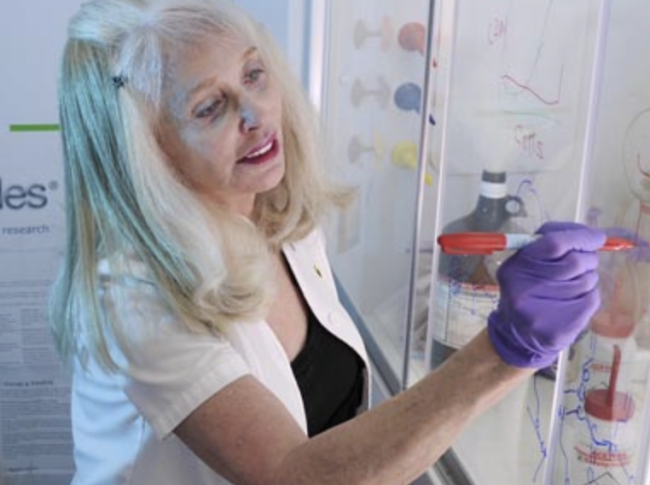You have /5 articles left.
Sign up for a free account or log in.

Ellen Vitetta
UT Southwestern
Ellen Vitetta, Distinguished Teaching Professor and Scheryle Simmons Patigian Distinguished Chair in Cancer Immunobiology at the University of Texas’s Southwestern Medical Center, worked for decades to make her institution more welcoming to women. She co-founded the Women in Science and Medicine Advisory Committee, which proposed and won an on-site childcare center and which continues to sponsor events on women’s issues in science.
Today, in some part because of Vitetta’s efforts, UT Southwestern has a permanent Office of Women’s Careers, and some 66 percent of employees in leadership roles are women. The institution even erected a multimedia display wall of 60 “trailblazing” female faculty members last summer.
Yet Vitetta—who is featured on that wall—says that none of this progress mattered when a group of younger, male administrators decided it was time for her to retire, starting in 2012, when she was approaching 70. That’s when she says she was forced to close a key part of her research center and surrender lab space to a new, younger male hire.
Following a series of parallel and escalating incidents—what she calls “death by a thousand cuts”—Vitetta sued UT Southwestern for discrimination on the basis of age and sex and for retaliation, in 2016. A resolution proved elusive, however. It took years for the Texas court system to decide that she could sue the state in the form of UT Southwestern, despite Texas’s strong sovereign immunity law prohibiting most causes of action against the state. And when that decision did finally arrive in Vitetta’s favor, in 2020, COVID-19 and shakeups on UT Southwestern’s legal team brought other delays.
Fearing that “this was never going to end,” Vitetta settled with UT Southwestern this fall for an undisclosed amount. Her initial ask was more than $1 million, to cover back pay and other financial losses, along with pain, suffering, inconvenience and legal fees. Vitetta says she can’t reveal details of the settlement but that she is pleased. She says she hopes to be able to donate some of the money back to UT Southwestern, to fund transparent, criteria-driven programs for off-boarding senior faculty members, and that negotiations to this end are ongoing.
UT Southwestern declined to comment on the settlement or the case, or even the general climate for women working at its sprawling Dallas campus, saying it does not discuss legal matters in public. But Vitetta wants her story told. She says her case highlights how academe has come a long way in welcoming women to its ranks—but that this project remains unfinished, particularly where sexism confronts ageism.
“Most academic professors can’t afford to launch lawsuits. I also thought briefly about just moving on, but quitting is just not in my DNA. I persevered because I wanted to shine a light on a problem that needed fixing,” Vitetta told Inside Higher Ed. “What happened to me has happened to many before me, and I know enough of these individuals that some of them were named as witnesses in my case. Ageism is discrimination, and they do it on purpose when it suits them as part of the quote-unquote mission of the institution. Worst of all, they are sneaky about it.”
What’s to be done? Vitetta said, “We need to have a discussion about tenure, about what it really means, and under what circumstances—other than being convicted of a felony—a faculty member should be asked or compelled to retire.” The process, she continued, “should be well-defined, fair, honest, interactive and kind. Not capricious, discriminatory, deceitful and cruel. Our next generation of senior faculty and tenured professors should not have to go through what I went through. Nor is it good for the institution.”
The Facts of the Case
Vitetta, a member of the National Academy of Sciences, the National Academy of Medicine and the American Academy of Arts and Sciences, started working at UT Southwestern in 1976 and served as director of the institution’s Cancer Immunobiology Center for 25 years. Although she estimates she’s brought about $50 million in funding to the institution over the years, she says that she was never given specific fundraising requirements. Things changed in 2012, however. That year, her lawsuit says, David Russell, who was then UT Southwestern’s new vice provost and dean of basic research, met with Vitetta for the first time to say he was planning on shutting down her manufacturing practice lab—where she made vaccines for clinical trials—in order to give this space to a younger male professor.
Vitetta protested, arguing that this would undercut her broader research center’s productivity. Russell allegedly told her that she was working inefficiently and that “nobody cares about vaccines.” Vitetta argued that she still had operating funds for the lab and that she was expecting to hear about a pending grant for a ricin vaccine the next month. Russell allegedly responded that she should “give the money back.”
For the next two years, Vitetta says, her research space saw “constant renovations and moves” in order to accommodate the new colleague’s research operation. Walls were taken down and electrical lines run around her and her team, she says, as her complaints about working through such conditions were ignored.
“Equipment, office records, reagents, freezers, refrigerators and everything else the lab used had to be moved again and again, each time her group was relocated,” the lawsuit says. Vitetta’s own research staff moved all but the heaviest equipment, and “personnel, productivity, research projects and acquisition of data were all severely compromised.”
Vitetta continued to apply for grants amid the disruption, but she did not secure coveted and highly competitive funding from the National Institutes of Health. This allegedly prompted Greg Fitz, then the provost, to tell Vitetta she must close her research center altogether because she hadn’t “raised enough funds” recently.
Vitetta says she subsequently was forced to cut 35 members of her staff of 40 and clear out decades of work, reagents and samples. In early 2014, she began to look for a new home for her remaining research group, but she says she was told that the microbiology department only had space for a “new recruit.” Immunology had a small space to offer her, but only temporarily, she says.
While Vitetta still didn’t have a new peer-reviewed grant, she did secure some $611,000 in funding between 2014 and 2016 from a joint venture she founded with a business program at UT’s Austin campus, called Enterprise Mimetics. The deal was $35,000 per month for Vitetta’s lab—a significant figure. But Vitetta says that UT Southwestern damaged this partnership when it began to insist that Enterprise Mimetics pay three months at a time, in advance, despite the company’s history of on-time payments.
Around the same time, according to the lawsuit, Fitz, the provost, informed Vitetta she’d have to complete her first posttenure review ever. Vitetta says that the review determined she was meeting expectations, except in the “overall” category, due to her lack of new peer-reviewed grants. As part of the review process, her department chair also wrote—allegedly without Vitetta’s input—that Vitetta was a “senior faculty member who is nearing the point of retirement and, presumably, will transition to the status of emeritus professor.”
Following this review, UT Southwestern informed Vitetta that her salary would be cut by $50,000, to $248,100, due to the “sustained absence of external grant support.” She allegedly was told she’d need to give up her meager 1,000 square feet of lab space within weeks, as well. Vitetta was granted a storage space in which to keep her materials, but she says the lab space she was supposed to vacate urgently remained empty for nine months. As for the timing of this move, Vitetta alleges that UT Southwestern wanted her to lose her lab space to kill her deal with Enterprise Mimetics, which was being renegotiated at the time.
The end goal was to back her into retirement, she alleges. Vitetta’s says her department chair admitted as much on several occasions, such as by telling her that administrators “probably made that up”—“that” meaning the suddenly grave distinction between peer-reviewed external funding and the kind of funding she was able to secure on her own between grants. The same chair, who did not respond to a request for comment, also allegedly told Vitetta that he’d catch flak for helping her because it was administrators’ wish that she retire.
Vitetta filed a complaint with Daniel Podolsky, UT Southwestern’s president, alleging age discrimination. He allegedly told her it was his view that the salary, lab space and staff cuts resulted from her decreased external funding. Vitetta still filed a grievance with the university’s director of equal opportunity, but that office allegedly backed the administration’s contention that Vitetta hadn’t raised enough money.
Trying to buy time for herself and her small remaining staff, Vitetta received a material transfer agreement of $100,000 from a biopharmaceutical company she’d worked with called Soligenix and signed over her personal share of $50,000 to UT Southwestern for her lab. Vitetta told Fitz that she now had sufficient funding for the lab through late January 2016, while two grant applications were pending, and that laying off any of her staff members should be delayed. But UT Southwestern did not wait and issued reduction-in-force notifications.
Vitetta looked into retaining interested staff members somehow by paying them as temporary workers with the Soligenix money. But she says that UT Southwestern promptly informed her that it intended to refund Soligenix $50,000—even though the company had made no such request. UT Southwestern apparently alleged that a relevant investigational new drug application with the NIH had expired, but Vitetta says Soligenix didn’t care about that and that she easily resolved the matter directly with the company. Some $25,000 eventually was returned to Vitetta’s lab, but the situation proved financially crippling in the interim, Vitetta says. By late January 2016, just one staff member working on a temporary basis remained.
Vitetta finally got her grant funded the next month. Yet even then, she says, she was denied lab space in the immunology department. The pathology department did offer room, but working outside of her faculty appointment home posed administrative headaches, she says. Moreover, her greatly diminished lab had already had to move locations by the time she filed her lawsuit against UT Southwestern later that same year.
Disparate Treatment
As evidence of disparate treatment, Vitetta says that when a 50-something male professor in her department similarly found himself without external grant money, he was allowed to maintain his lab space and their chair helped temporarily with his salary and operating funds.
Two younger male professors in ophthalmology also were given this kind of bridge funding during gaps in their grants, Vitetta says. In one of these cases, UT Southwestern allegedly funded the professor’s full salary, along with the salaries of his support staff, in the same 2014–16 time frame when Vitetta was fighting to maintain a foothold on campus.
“UTSW provided funding to both of these younger men from discretionary portions of their department’s budget, without the dean’s or UTSW’s having tied the department chair’s hands with respect to any bridge funding the department provided,” Vitetta’s lawsuit says. And when “either of these two men were able to cobble together a solution to their funding gaps, the dean and other members of UTSW’s administration did not actively intervene to sabotage their efforts—making unilateral decisions on sponsored research agreements or other private funding sources, removing funds from their lab’s bank accounts without their agreement, and terminating their lab personnel even when funding was available.”
What Vitetta has contributed “and will continue to contribute counts for nothing, and younger faculty members in their 30s and 50s have received more favorable treatment—most of them men,” the lawsuit continues. “All of this is clear evidence of age and gender discrimination. All of UTSW’s discriminatory actions against [Vitetta] have cost her more than just her $50,000 per year decrease in salary, loss of lab space and support staff. [Vitetta] is now months or years behind on delivering important, lifesaving vaccines to research companies, and potentially saving the lives of ultimate end users (including, in the case of her ricin vaccine, the men and women serving overseas in the military, who may be subjected to biological warfare).”
Vitetta filed allegations of discrimination and retaliation for reporting discrimination with the Texas Workforce Commission’s civil rights division in 2015. The commission issued a right-to-sue letter in 2016, and Vitetta filed her lawsuit in a district court later that year.
According to Texas labor code, an employer breaks the law if it discriminates against a worker based on gender or age in terms of compensation or other conditions of employment. Likewise, it breaks the laws if it segregates or classifies a worker in a way that deprives or tends to deprive them of any employment opportunity, or otherwise adversely affects them.
Vitetta and her lawyer, Walter Taylor—who took on the case with a contingency agreement—thought she had a strong chance at winning. The pair thought the case was especially bolstered by a colleague who provided an affidavit supporting Vitetta’s assertion that UT Southwestern was using one set of rules for her and another for the younger male colleagues who were offered bridge funding.
“While these younger men may be good scientists, it is an objective fact that neither has the qualifications or accomplishments that Dr. Vitetta has,” the affidavit said. “Nor does either hold the positions that Dr. Vitetta holds at UTSW. Neither of these younger men is a full professor, neither has tenure, and neither holds an endowed chair. In contrast, Dr. Vitetta is a full professor, has tenure, occupies an endowed chair and, in part due to her longevity, has contributed substantially more to her fields—immunology and microbiology—than either of these gentlemen has contributed thus far.”
In 2020, after much legal back-and-forth, a state appeals court ruled that Vitetta’s case could proceed, on the grounds that “Vitetta’s evidence raises a genuine issue of fact on this jurisdictional element on her lab-related age and sex discrimination claims.” Additionally, the court’s opinion says, “a fact-finder could infer that Dr. Vitetta’s age and sex were motivating factors in UTSWMC’s decisions to cut her salary and lab in 2015. After several decades of successful employment, UTSWMC’s actions toward Dr. Vitetta as she approached and surpassed age 70 worsened and increased in intensity over time, culminating in a significant salary reduction and loss of her research lab and lab staff.”
The court also weighed in on a newer claim, dating back to 2017 and 2018, that administrators discussed Vitetta's lawsuit in a negative light with members of the Faculty Senate, of which Vitetta was the president. Vitetta hadn’t widely disclosed the lawsuit at the time, and these alleged discussions prompted a vote of no confidence against her.
The university argued that no adverse action existed here because being president of the Faculty Senate was a voluntary, elected position. But the appeals court found that “considering both the prestige and the influence a position as president of UTSWMC’s Faculty Senate offers, we conclude that Dr. Vitetta has raised a genuine issue of fact on whether the action was sufficiently harmful to dissuade a reasonable worker from complaining of discrimination and thus believe the action was sufficiently adverse to raise a fact issue.”
Vitetta is still working at UT-Southwestern and says she faced additional salary cuts while her case was pending.
Speaking Out
A trial date was set for October of this year, Vitetta said recently, but it was pushed back due to departures from UT Southwestern’s legal team. While Vitetta was initially opposed to a settlement, she said, the idea became more appealing after a decade of fighting and years in court. While she’s settled, she’s not staying quiet.
“Great strides have been made over the last 25 years because of the efforts of myself and others both at UT Southwestern and elsewhere,” she said. “We have a Women’s Science and Medicine Advisory Committee, an Office of Women’s Careers, a childcare center, many onboarding seminars,” and so on. “Unfortunately, this progress only applies to junior and midcareer faculty. For senior faculty there is nothing, and it is still a boys’ club at the top.”
Some of Vitetta’s former colleagues agree that what happened to her fits a pattern of squeezing out longer-serving women.
Nancy Street, a longtime associate dean at UT Southwestern’s Graduate School of Biomedical Sciences, said that she left earlier this year because she was effectively pushed out of her role leading diversity and inclusion initiatives after the institution hired a younger man as an assistant dean. Street said her male supervisor suddenly reassigned her and verbally told her she was “too difficult to work with.” Eventually, Street said, the supervisor started asking her for weekly reports about her work and warned her of a potential salary cut at her next formal review.
“I think that it needs to be heard,” said Street, “just this sort of discarding of people who built the institution.”
Nancy Rollins, a longtime tenured professor at UT Southwestern who last served as an associate dean of clinical research, said she left in 2021 over climate issues that peaked after she reported Russell, the dean implicated in Vitetta's case, for emailing her unsolicited, inappropriate jokes about action star Chuck Norris.
Rollins said she wrote to Russell (who did not respond to a request for comment) to express disappointment that she wouldn’t be allowed to present a certain project she’d worked on. In response, she said, the supervisor sent her two pages of jokes such as, “Chuck Norris wears a live rattlesnake as a condom,” and “Chuck Norris’ sperm is so badass, he had sex with Nicole Kidman, and 7 months later she prematurely gave birth to a Ford Excursion,” telling Rollins to substitute her name for Norris’s.
Rollins said she felt she had to report the incident in light of a new state law requiring public college and university employees to report harassment or face possible consequences themselves. But her relationship with Russell became untenable after that, she said.
“We all know retaliation is against the law, so there was no retaliation—except he wouldn’t get in an elevator with me. He wouldn’t meet with me,” Rollins said. “I basically became disempowered, and so after I got my final annual evaluation that said I was doing a great job, blah, blah, blah, I tendered my resignation. And I walked after 35 years from the only job I’d ever had.”
Vitetta thinks that older female faculty members face disparate treatment well beyond UT Southwestern, even as women who were juggling work and child-rearing duties earlier in their careers may look forward to working past traditional retirement age to make up for lost time.
“They recognize these later years as an opportunity to focus and achieve professionally,” she said of such women. Yet too often, she continued, the institution “decides it’s time for you to go, and then they—without warning—marginalize you, gaslight you and retaliate, even in subtle ways, if you speak up.”
Asked about the interplay between sexism and ageism in academe—where there is by law no mandatory retirement age—Barbara Risman, distinguished professor of sociology at the University of Illinois at Chicago and editor in chief of the journal Gender & Society, said “we know that women still face barriers in university settings, especially in STEM fields.” Ageism, meanwhile, is gendered, she said, "and sexism differs for women and men, and so I do think we should expect that senior women may be pushed out, and treated less as assets and more as liabilities, than senior men.”
Risman said she wasn’t aware of any research on the subtle ways that senior faculty members may be treated differently by gender, but this “is an incredibly important question that we definitely need to study.”
“Given what we know from other research about the discrimination of women in higher education, however,” she said, “I would suggest we have enough evidence that universities that support gender equity for faculty ought to include training efforts to ensure equity for senior faculty in their [diversity, equity and inclusion] efforts.”
The first step, Risman added, “would be to gather data about age at retirement, and then, if disparities exist, to do exit interviews with faculty to gather evidence about whether women are pushed out by a lack of support, or with other subtle interactional experiences that give them the message they are no longer valued.”
Across academe, women remain underrepresented among full professors, at about 34 percent, according to data from the American Association of University Professors. Women’s representation in college administration is growing, according to information from the College and University Professional Association–Human Resources, but they remain underrepresented in executive leadership positions, holding fewer than 40 percent of these roles.
Susan Shaw, a professor of women, gender and sexuality studies at Oregon State University who has written about women and ageism in academe for Inside Higher Ed, said colleges and universities do “need to think more about how to use the wisdom and expertise of older women faculty.”
Shaw said it might be helpful for institutions to think about “more ways to keep older faculty engaged,” such as with travel grants, special advisory group roles or temporary appointments that leverage their particular expertise. Faculty members need more pathways to and help planning for retirement, she said, and enrichment opportunities don’t have to end upon leaving the institution, either.
Colleges and universities also "need to provide more training for department chairs and deans on ethical and humane ways to deal with older faculty who aren’t really doing their jobs anymore and on ways to support difficult but productive faculty they may just not like—or may see taking up too many resources with their big salaries,” Shaw said. “And, of course, seeing how these responses are gendered and racialized is key.”
Vitetta, who continues to do research, says she'll be ready for an emeritus position in 2025.









